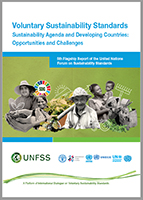
This report discusses the role of Voluntary Sustainability Standards (VSS) in advancing the sustainability agenda in developing countries, and assesses the opportunities and challenges associated with VSS uptake in those countries.
Given their design and requirements, VSS can be considered as important tools to achieve environmental, social, and economic sustainability. It is expected that compliance with VSS requirements would contribute to mitigating environmental crises, and to improve social and economic sustainability in terms of food security, improved livelihood, job creation and poverty alleviation, among others.
However, VSS could also represent a challenge for developing countries and small producers in these countries. As VSS can increase information and production costs and eventually exclude smallholders and producers in developing countries from GVCs.
The report aims to:
- Examine the opportunities VSS offer for developing countries, and their role in advancing the environmental, social and economic sustainability agenda in those countries.
- Present the challenges developing countries face with regard to VSS uptake and use.
- Distil policy implications that could provide guidance to both policymakers and researchers.
Chapter 1 provides an overview on VSS in developing countries. It introduces VSS as a governance tool and describes their evolution and uptake. Challenges to VSS uptake in developing countries are also discussed.
Chapter 2 presents the on-ground impact of VSS on environmental, social, and economic sustainability. It provides an overview of the current state of research on the impact of VSS based on a selected number of studies. It also assesses the role of the degree of compliance with VSS on their impact.
Chapter 3 focuses on the broader political and policy context around VSS, including the governance context in which VSS operate, their complementarity or competition with newly established national standards, their link with new due diligence legislations, and their integration in broader policy mixes.
Chapter 4 concludes the report and provides policy recommendations on how to further harness VSS opportunities and address their challenges and risks in developing countries.





